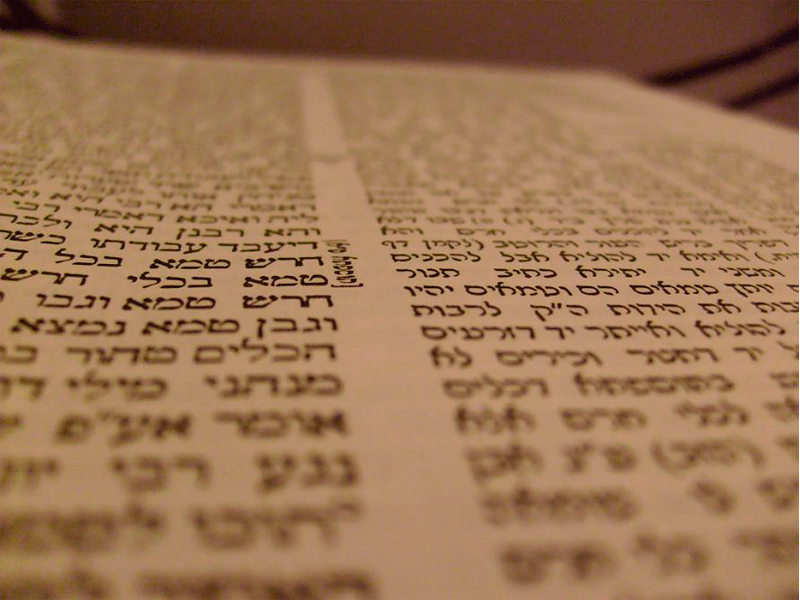Thousands of Jews from across the globe recently gathered en masse to celebrate the completion of the Talmud study program known as the daf yomi. After studying a consecutive page every day for seven-and-a-half years, the participants reach the monumental feat of covering the 2,711 pages of the Babylonian Talmud, known colloquially as “Shas.” Anyone remotely familiar with the depth, intricacies and nuances of the Talmud is well aware that such an accomplishment is no child’s play. Hours of sweat, brainpower and dedication must be expended on a daily basis.
So it behooves us to ask: what is it that spurs an estimated 350,000 people worldwide to forge ahead with such a task? What is it that drives doctors, lawyers, professors, businessmen, and rabbis to rigorously study a text compiled millennia ago?
Although the debates, expositions, and exegeses of the Talmud are, in fact, the basis for contemporary Jewish law governing all aspects of a Torah-abiding way of life, that does not fully answer the question. The final rulings for all halakhic matters have been codified in other texts – one might believe that the study of how such conclusions were arrived at would pique the interest of just a few dedicated scholars. Yet the Talmud preoccupies the minds of hundreds of thousands of people globally. Why?
The Torah, both written and oral, is not just a code of law. It is our bond with our creator – as the Zohar tells us, “He and His will are one.” Those who toil in its study are not merely engaging in an intellectual pursuit. They are connecting to eternity. Faced with the transience of the material world, the Torah assures us a connection to something which is everlasting. As long as we remain firmly engaged with it, we know that our lives have meaning.
The study of Torah is also the key to our survival as a nation. History shows that communities that lose their connection with our divine wisdom are inevitably swallowed up by their host societies and cultures. By contrast, those who are able to retain their bond with the Torah through daily engagement are able to withstand the natural allure of assimilation.
Daf yomi ensures that its participants do not go a day without engaging with our eternal wisdom. There are no breaks or vacations.
In last week’s Torah portion, the scriptures relate how Joseph’s brothers returned to their father with the news that they had found Joseph still alive and that he was the ruler of the entire land of Egypt. We are told, “But he had a turn of heart, for he did not believe them.” What was it that Jacob did not believe? Was the enormity of the news simply too much for him to swallow, or was there perhaps more at play?
The great Mussar giant Rabbi Elya Lopian explained, that in the vernacular of our forefather Jacob, being “alive” was not limited to physical existence but referred primarily to spirituality. If his sons had told him that Joseph was still “alive,” they must have meant that he was still spiritually intact. However, Jacob saw in the latter half of their message, that “Joseph was a ruler over all of Egypt,” as a contradiction to the former. How could it possibly be, that after ascending to the position of second-in-command in the morally abhorrent land of Egypt, that Joseph could have retained his exalted level of spirituality?
We are told in the next verse that the brothers showed their father “the wagons” which Joseph had sent him. The Midrash, as quoted by the great medieval commentator Rabbi Shlomo Yitzchaki (Rashi), explains that the wagons were being used by Joseph to send Jacob a message. He wanted his father to know that in spite of the many years that he was forced to spend in a foreign land, a place anathema to the ideals promulgated in his fathers house, he still remembered the last Torah portion that he had studied with his father (“wagon” being the same Hebrew word used for “calf,” the subject which Jacob and Joseph had studied before being separated).
After receiving this message, we are told “Then the spirit of their father Jacob was revived.” Jacob understood that if Joseph was able to maintain a strong relationship with Torah study throughout his sojourn in Egypt, he would have had the requisite resources needed to remain a devout Jew regardless of his surroundings.
No less of a personality as King David, whose accomplishments are paralleled by no other king in our national history, exclaimed in Psalms, “If not for Your Torah, my delight, I would have been lost in (the pain of) my affliction.”
Stories abound of young yeshiva students who, after a long day of backbreaking labour in the Nazi camps, would gather together and review the Talmudic passages (which they could remember by heart). Those boys understood that they had in their possession a resource which could elevate them far above their surroundings, connecting them to a higher plane. Some of the most emotional attendees of the various siyum haShas events around the world were these same precious Holocaust survivors who are still amongst us. With tears in their eyes they rejoiced at the celebration of the vehicle to our survival.
In our present day and age, we are fortunate in more respects than we realize. One thing we should be exceedingly thankful for is the proliferation of aids to Torah and Talmud study. With numerous publications (including English translations), plus the proliferation of websites and apps, there has never been an easier time to engage with study, whether you are a true beginner or an advanced scholar. It’s never too late to connect to greatness.
Author

Rabbi Baruch Weiss is an alumnus of Yeshivas Ner Yisroel, the Brisker Yeshiva of Rav Dovid Soloveitchik, and Kollel Tiferres Yisroel. He is Editor-in-Chief of the Reflections newsletter, a project of Kollel Toronto and a contributing journalist for the Yated Ne'eman newspaper. He can be reached at [email protected].
View all posts







